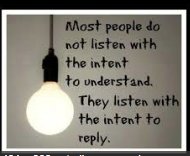I know we call them study skills, but I think a more appropriate name is life skills. No, I am not talking about learning how to pay bills (blah) or keep the well-stocked fridge ( I admit I have candy in the fridge). I am talking about those skills that get one through school and then magically help to create a successful life.
It’s true! There are skills that we can teach our kids in middle and high school that, if they learn them (very important) and use them (that’s the catch), they will have more success in college, in career, and in relationships than if they didn’t know and use them. Want to know them?
Ok, here are my top three study skills:
1. Listening Skills 2. Time management Skills 3. Organization Skills
What?????? No test taking strategies, no note taking? Nope. Those are important, but they don’t make my top three. You can’t do those if you don’t do these.
Let’s talk about listening today.
Shhhh…….Listen. Think about it. Just for a minute. Listening. Wow, that is a big help in the classroom, and in the workplace, and in every relationship I have ever had; from marriage to children, from child to friend. When I understand how to listen, not just hear, I am suited to be all the things I need to be: teacher, wife, mother, daughter, and friend. We need to take the time to block out all the other junk in our lives, focus on the person speaking to us, and concentrate on really being in. the. moment.
In the classroom, if our students are able to listen to us they are able to take notes, remember the lessons, and most importantly ask questions. Here are several things to do as you listen:
1. Put all other material out of the way. If you are in a classroom, keep paper and a pen out. If you are face-to-face, stuff all your gear away. GET RID OF THAT PHONE!!!!!
2. Focus on the person speaking. Yes, even if they are boring. Yes, even if you couldn’t care less about what they are saying. Let’s face it, that happens more than we would like to admit. Plus, it happens to students more than adults. Every day. Actively engage in what they are saying. Stay interested in the meaning of their words. Hmmmmm. Ok, you say. That’s easy when someone is talking about something I am interested in. But, how does one do this when the topic is putting you to sleep? Ah, on to the next…
3. Ask questions and restate their words. What??????? Ask the person questions. “What do you mean?” “How so?” “Can you give me another example?” “So what your saying is….” “What I hear you saying is….is that correct?” Ask yourself questions. “What did they mean by that?” “How do I put that in my own words?” “Is there a part of my life that is similar to that?” “Where else could I use that information.” By all means, don’t think about what you want to eat for lunch!
3. When the lecture, conversation, discussion is over take a moment to review. By yourself. Just make sure you understood what all happened. Review your notes, add to them, jot down questions you may still have. If you do this directly after (or as soon as you are able) you are more likely to remember and understand.
The main thing is to practice, practice, practice. Listening is a skill. Like any skill it takes practice in order to do it well and integrate it into your life. This is true if you are 14 or 54 years old. It makes a difference in your life. It really does. Try it.